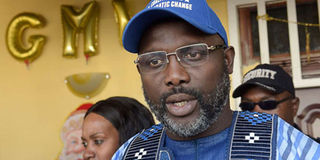World toasts to newest leader Weah as African 2017 election season ends

Liberian newly elected President George Weah. PHOTO | SEYLLOU | AFP
What you need to know:
Weah proved his mettle on the football pitch by becoming the only African to win the Fifa World Player of the Year award.
Zambia, Zimbabwe, Senegal, South Africa, among others, underwent significant periods of political instability.
Also important were South Africa’s polls to choose the leader of the ruling African National Congress, during which Cyril Ramaphosa replaced President Jacob Zuma.
In January, the world watched in awe as the eccentric Gambian dictator Yahya Jammeh was shown the door.
As the 2017 African electoral season ends, the world is still toasting the achievements of Liberian president-elect George Weah, 51.
Weah proved his mettle on the football pitch by becoming the only African to win the Fifa World Player of the Year award.
Popularly known as “King George”, Weah rose from his lowly birth in a slum of capital, Monrovia, to play for top local clubs.
He eventually made his debut on the international scene and ended up playing for European clubs like AS Monaco and Paris Saint-Germain.
He later played for Chelsea and Manchester City in England, but it was while at AC Milan that Weah won the Ballon d’Or in 1995.
ACHIEVEMENT
He will be taking over from Nobel Peace laureate and Africa’s first elected female president Ellen Johnson Sirleaf.
She became president in 2006, and will now join a growing list of African heads of state who have relinquished power peacefully after serving their constitutional mandates.
Weah’s achievement came at the end of a momentous year during which elections were held in several African countries.
The usually volatile Lesotho held a snap poll in June. Others took place in quick succession in Kenya, Angola and Rwanda, with the former country’s presidential one proving to be chaotic.
Later, greater or lesser elections were held in the Republic of Congo, Senegal, Equatorial Guinea and breakaway Somaliland.
In the meantime Zambia, Zimbabwe, Senegal, South Africa, among others, underwent significant periods of political instability.
RAMAPHOSA
Also important were South Africa’s polls to choose the leader of the ruling African National Congress, during which Cyril Ramaphosa replaced President Jacob Zuma.
Other major events included the election of African Union Commission officials.
The year also saw the dethroning of Zimbabwean president Robert Mugabe, as his ailing Angolan counterpart Eduardo dos Santos stepped down. The elderly autocrats left dubious legacies.
In Angola orderly elections were held on August 23.
However, the Zimbabwean political scene is still fluid, with the first post-Mugabe elections expected in 2018, amid worries that old Zanu-PF denizens would be recycled.
JAMMEH
In January, the world watched in awe as the eccentric Gambian dictator Yahya Jammeh was shown the door.
After an election whose results he refused to accept, the unpredictable Jammeh was shuttled aside by Ecowas troops.
In the meantime, there will be elections in 2018 in countries like Sierra Leone, Madagascar, Egypt and a couple of others.
Hopefully, there will also be changes in troubled countries like Cameroon, Mali and even South Sudan.





